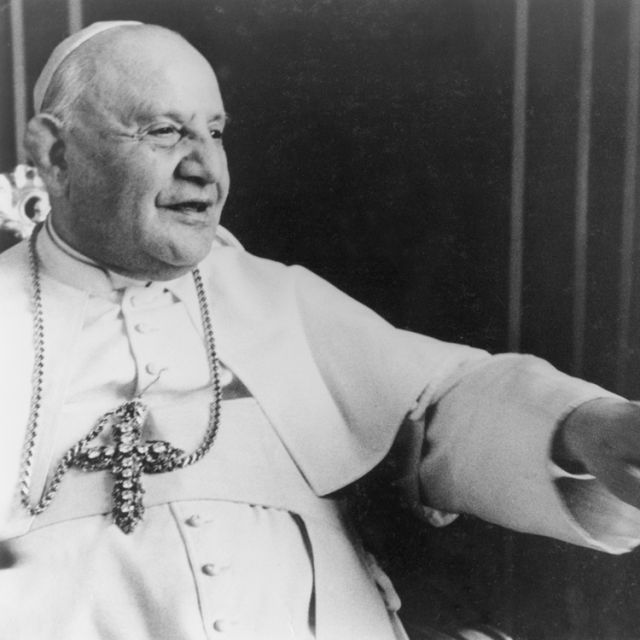"The documents of Vatican II have an integrity such that you have to look at them as a corpus," said Father O'Malley, author of the book "What Happened at Vatican II." He gave the initiative's Philip J. Murnion lecture June 1 at The Catholic University of America.
Unlike previous church councils, such as the Council of Trent, Vatican II's documents build upon one another, and have "inter-textual" qualities, which was a new innovation for such material, said Father O'Malley. He also has written a book on the Council of Trent to be published this year.
"Gaudium et Spes" was the last document of Vatican II to be promulgated, in December 1965. Unlike the other documents, it was not drafted before the council began but arose from discussions during the sessions, Father O'Malley explained.
Belgian Cardinal Leo Jozef Suenens gave "an electrifying speech" about the need for a central theme on the floor of the council that helped unify what had until then been a somewhat chaotic process, he said. With the encouragement of Pope John XXIII, Cardinal Suenens shepherded what would become the council's consideration of the church in the world.
Its themes about how the church is a part of the modern world addressed the need for relationships between the church and nonbelievers; said the quest for peace should be continuous; urged international cooperation in aiding underdeveloped nations; and discussed the "nobility of marriage" and the role of conjugal love.
Father O'Malley said "Gaudium" was significant for its "new stance toward the modern world," that the church is to be of service to the world, working to combat war, hunger and poverty; that it can learn from the non-Catholic world, not as an enemy but as a potential partner; and for raising up "conscience as the ultimate personal norm for decisions."
He also said it was striking for being addressed not just to Catholics, but to all men and women of good will, beyond the bounds of the church.
"No previous council particularly took note of those outside the church," Father O'Malley said, except occasionally as examples of wrong behavior or flawed theology.
"It was a hymn to human dignity," said Father O'Malley, "an extremely positive consideration of human nature."
Early criticism of the document's drafts included the point made by Germany's then-Father Joseph Ratzinger, now Pope Benedict XVI, that the document wasn't theological enough and didn't adequately discuss the role of sin or the suffering of Jesus on the cross, Father O'Malley said. By the time it was passed overwhelmingly by the council late in 1965, it had been adapted somewhat to take such critiques into account, he added.
In cautioning not to take individual documents of Vatican II out of context, Father O'Malley cited recent movement at the Vatican toward reconciling the Society of St. Pius X, a traditionalist group that split with the church over whether they had to adopt the reforms of Vatican II. For instance, some of the society's leaders continue to reject parts of "Nostra Aetate," the Declaration on the Relationship of the Church to Non-Christian Religions, including its condemnations of anti-Semitism and of the idea that the Jews were to blame for the death of Jesus.
Father O'Malley said allowing the society to "pick and choose" which Vatican II documents it accepts would amount to a strategy of "divide and conquer," because the council documents are so intricately linked that shelving one piece would lead to the downfall of the whole package.
Major themes link the documents, notably that of reconciliation, which he said is expressed in different, important ways throughout the documents.
"Reconciling with the modern world doesn't just mean using computers," Father O'Malley said, but getting in touch with the wide-ranging components of the modern world, many of which the church had previously ignored, and sometimes making that outreach in ways that called for reconciliation.
One of two respondents to Father O'Malley's talk, Mercy Sister Doris Gottemoeller, an administrator at Catholic Health Partners, continued the theme of reconciliation, saying that far from being a sign of weakness, reconciliation requires great dignity and courage.
Another respondent was Father Michael Place, a Chicago priest, served as theologian to the late Cardinal Joseph Bernardin, who began the Common Ground Initiative.
The priest, who now works for the Franciscan Leadership Enhancement Program, and said in this time of great polarization, the way to make progress in society or in the church is to look for a "critical mass" of those who are willing to engage in dialogue.
That group can typically be found in the middle of views on an issue, he noted, maybe adding up to 30-40 percent of the people involved. Those on the edges may never be willing to participate in a dialogue, he said.
"And it all has to be grounded in prayer," Father Place added. "If not, it's not dialogue."

